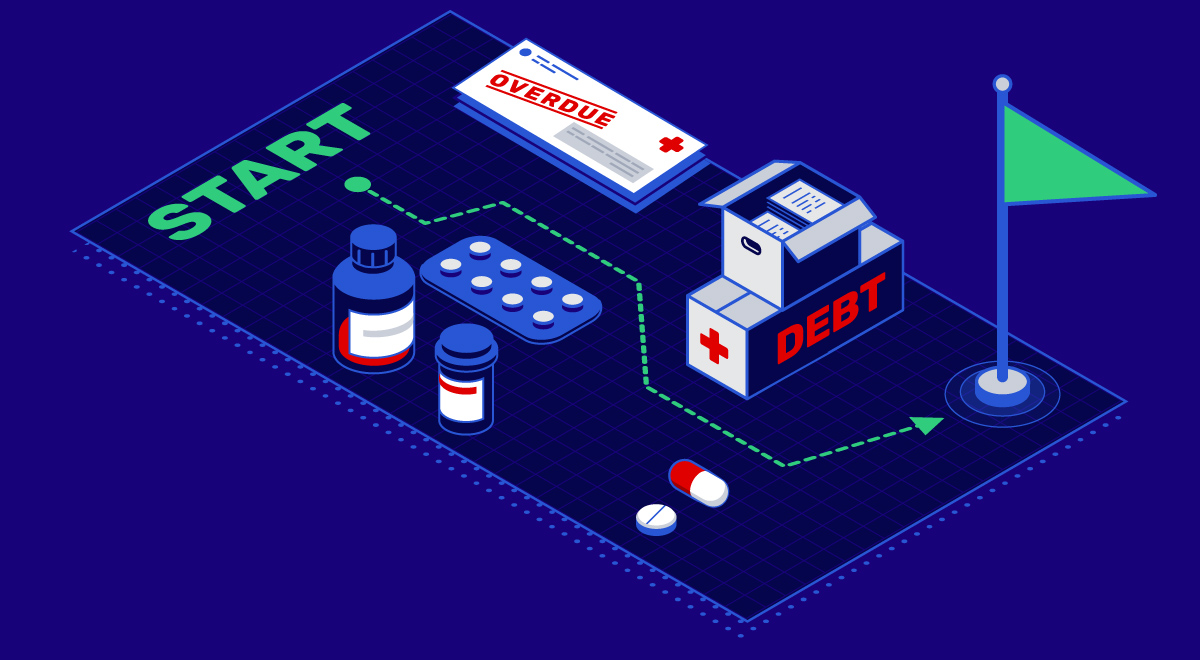
Medical debt is a real problem in the United States. In fact, 41% of American adults currently deal with this issue. Because Medicare typically covers seniors, most of those who incur medical debts are younger. If not managed correctly, these bills can become a lifelong problem.
The Consumer Bankruptcy Project surveyed bankruptcy filers and found that most people cited medical bills as the source of their financial issues. Even though filing can provide relief from these debts, doing so will leave a mark on your credit record for up to 10 years, making it almost impossible to get a mortgage or car loan.
Even though medical debt is all too common, there are plenty of steps you can take to prevent it from accumulating and avoid the consequences.
Focus on Prevention
The best way to deal with medical debt is to prevent it. There are two types of preventive measures you can take. First, you can focus on remaining healthy to lower your chances of needing expensive treatments. Second, you can purchase insurance that will cover the more expensive treatments.
To improve your general health, you can engage in daily exercise and healthy eating. Studies have shown that walking for at least four hours per week and eating a diet filled with plant-based foods reduced the risk of cardiovascular disease.
Quitting smoking and reducing the intake of harmful substances, such as alcohol, can also limit your chances of developing a disease that requires extensive medical treatment.
Prevention tactics also involve regular visits with a general physician which can be attained through an insurance policy. Luckily, many employers supply a discounted rate for certain insurances that offer free preventative visits, such as checkups, immunizations, and annual consultations.
Finally, one of the best ways to avoid serious health issues is to prevent your stress from accumulating. This can be a difficult task for those that cite their declining mental state on financial stress. However, if left unchecked, mental health issues can result in physical symptoms like ulcers. Staying healthy and having the right insurance coverage can keep you both physically and mentally fit.
Do Your Homework
Even if you do your best at preventing illness, chronic conditions can still develop which will require treatments prescribed by doctors. Once you hear about the treatment plan, you can take a few steps to ensure that it is the right option for your needs and is worth the cost.
- Check with your insurance provider to see if the treatment, medication, or procedure is covered.
- Look at studies related to your treatment to find out about success rates and potential alternatives. Evidence-based studies in respected medical publications are the best sources for this type of research.
- Consider getting a second opinion from another physician before committing to the treatment plan. Another doctor can confirm the diagnosis, offer additional insights about the treatment plan, and offer alternatives if they are available.
Ultimately, you should rely on medical professionals for advice on diagnosis and treatment.
Pay Attention
Stay informed about your healthcare finances by reviewing all medical bills. You can keep a file of all your statements to ensure that you are not double charged and that all information is correct.
You can also research medical bill relief options and programs that can help you manage medical debts so that they do not become overwhelming.
You can also keep track of appointments and make notes about what tests, exams, or services you got during the visit. Most healthcare providers have online health records that you can access. You can look at these after each visit or treatment to ensure all the information is correct. You can also ask to look at records to ensure they are correct.
You may need to retain your medical bills for tax deductions at the end of the year, bill disputes, or insurance claims. Keep paper records of your medical bills in a safe place and ensure that you have access to digital records.
Stay In Your Network
If you do have insurance, make sure your providers are within your insurance network. One common mistake that patients make is visiting a provider outside of the network that the insurer does not cover. If you go to such a clinic or hospital, you could be responsible for the entire bill.
You can avoid this problem by contacting your insurance company to confirm that they cover the facility you plan to visit. You can also carry your insurance card with you when you go to the clinic to verify that they accept your policy. Insurers often have different policies, so the receptionist will need to check the codes on your card to confirm acceptance of your coverage.
If you lack insurance, you can visit community health clinics, which offer free or reasonable care for most basic illnesses.
Research Billing Codes
Although your provider will typically have an understanding of your medical record, you should confirm the information, even if that means researching the billing codes.
International Classification of Diseases (ICD) codes, maintained by the World Health Organization (WHO), let medical professionals know which conditions you have. E08, for example, is the code for diabetes due to an underlying condition, and E08.21 is the code for diabetes with diabetic neuropathy.
These codes provide exact details about your condition. They can be important for understanding your diseases, communicating with medical personnel, and verifying insurance coverage. Your understanding of relevant codes can also help you ensure correct billing.
Negotiate
You can negotiate prices with a healthcare provider or ask them to deal with the insurance company on your behalf to come up with acceptable treatments that fit with your policy.
Furthermore, most providers will work with patients to set up a payment plan that they can manage. This plan should have no or low interest and let you avoid the use of a loan or credit card charges. Ultimately, providers would rather work with you to find a solution than refer your account to a collections agency.
Get Some Help
While you can avoid debt stress by being proactive and avoiding expensive medical bills, sometimes you will end up dealing with high costs despite your best efforts.
If you find yourself with a substantial bill, know that there are options for dealing with medical debt:
- Try a debt settlement service to negotiate a manageable monthly payment.
- Take stock of your insurance and switch to a policy that provides better overall coverage. You can change premium and copay options to balance your monthly premiums and your overall coverage
- See if you qualify for assistance programs or sliding scale payments based on your income and ability to pay, instead of a fixed price.
- Consolidate your debts. You can combine medical debt and credit card debt into one loan. This option can work if the combined interest rate is lower than what you currently pay.
These steps can help you control your medical bills before turning to bankruptcy or having your accounts go to a collections agency.
At National Debt Relief, we take pride in empowering people to regain their financial stability through our proven debt relief program. Contact us and talk to a financial expert who will work with you to find the best option to settle your debt and help you achieve financial independence.







